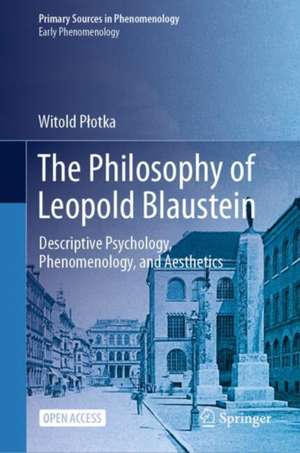The Philosophy of Leopold Blaustein: Descriptive Psychology, Phenomenology, and Aesthetics: Primary Sources in Phenomenology
Autor Witold Płotkaen Limba Engleză Hardback – 20 sep 2024
Preț: 430.97 lei
Nou
Puncte Express: 646
Preț estimativ în valută:
82.49€ • 89.63$ • 69.34£
82.49€ • 89.63$ • 69.34£
Carte tipărită la comandă
Livrare economică 21 aprilie-05 mai
Preluare comenzi: 021 569.72.76
Specificații
ISBN-13: 9783031636844
ISBN-10: 3031636848
Ilustrații: X, 330 p. 4 illus.
Dimensiuni: 155 x 235 mm
Greutate: 0.64 kg
Ediția:2024
Editura: Springer Nature Switzerland
Colecția Springer
Seriile Primary Sources in Phenomenology, Early Phenomenology
Locul publicării:Cham, Switzerland
ISBN-10: 3031636848
Ilustrații: X, 330 p. 4 illus.
Dimensiuni: 155 x 235 mm
Greutate: 0.64 kg
Ediția:2024
Editura: Springer Nature Switzerland
Colecția Springer
Seriile Primary Sources in Phenomenology, Early Phenomenology
Locul publicării:Cham, Switzerland
Cuprins
1 Introduction.- 2 Blaustein and His Times.- 3 Psychological Themes in Blaustein’s Philosophy.- 4 The Basics of Blaustein’s Descriptive Psychology in the Context of Twardowski’s Theory of Presentations.- 5 Analysis of Blaustein’s Critique of the Phenomenological Method.- 6 An Examination of Husserl’s Theory of Content.- 7 A Reappraisal of Blaustein’s Exposition of Husserl’s Theory of Content.- 8 Aesthetic Experiences and Their Objects.- 9 Toward a Phenomenology of Media.- 10 Conclusion.
Notă biografică
Witold Płotka, is Associate Professor at Institute of Philosophy of the Cardinal Stefan Wyszyński University in Warsaw. He was a visiting researcher at the Husserl-Archiv of the University of Cologne. His publications include articles on, for instance, the theory of intentionality, theory of knowledge, and the history of the phenomenological movement in Poland. He is a co-editor (together with Thomas Byrne) of the Special Issue of the “Horizon. Studies in Phenomenology” (9 (2), 2020) dedicated to Ingarden’s philosophy and (together with Patrick Eldridge) Early Phenomenology in Central and Eastern Europe: Main Figures, Ideas, and Problems (2020). He published two books on phenomenology. He is the winner of “The 2011 CARP Directors’ Memorial Prize in Honour of José Huertas-Jourda.” He is member of the Husserl Circle, a former Secretary of the Polish Phenomenological Association, co-founder and present President of the Central and East European Society for Phenomenology (CEESP). Recently he published studies in the Journal of the British Society for Phenomenology, Phenomenology and the Cognitive Sciences and Frontiers in Psychology.
Textul de pe ultima copertă
This is an open-access book which is devoted to rediscovering the early history of phenomenology in confrontation with the legacy of Franz Brentano by discussing Leopold Blaustein’s philosophy. It offers a unique perspective on the history of the phenomenological movement by presenting the development of Blaustein’s theory. Blaustein was a philosopher educated by Kazimierz Twardowski in Lvov, but he also held research stays in Freiburg im Breisgau (where he studied under Edmund Husserl) and in Berlin (where he met Carl Stumpf). Blaustein’s work is usually classified as phenomenology yet some scholars question this by claiming that Blaustein was radically critical of Husserl’s phenomenology. This text addresses these divergent opinions by claiming that Blaustein was both a descriptive psychologist and a phenomenologist. Moreover, the book shows that these two motives were intertwined in Blaustein’s writings and require a reference to other traditions such as the Gestalt theory of Stumpf, and the humanistic psychology of Dilthey. This volume examines sources, context, and applications of the methods used by Blaustein in his original philosophy. It appeals to philosophers, especially phenomenologists, epistemologies, and historians. The more specialized chapters are also relevant to historians of the phenomenological movement and the Brentanian tradition.
Caracteristici
This book is open access, which means that you have free and unlimited access Examines relevant questions of how to apply phenomenology in non-philosophical contexts First in-depth analysis and discussion of Leopold Blaustein’s contribution to philosophy







